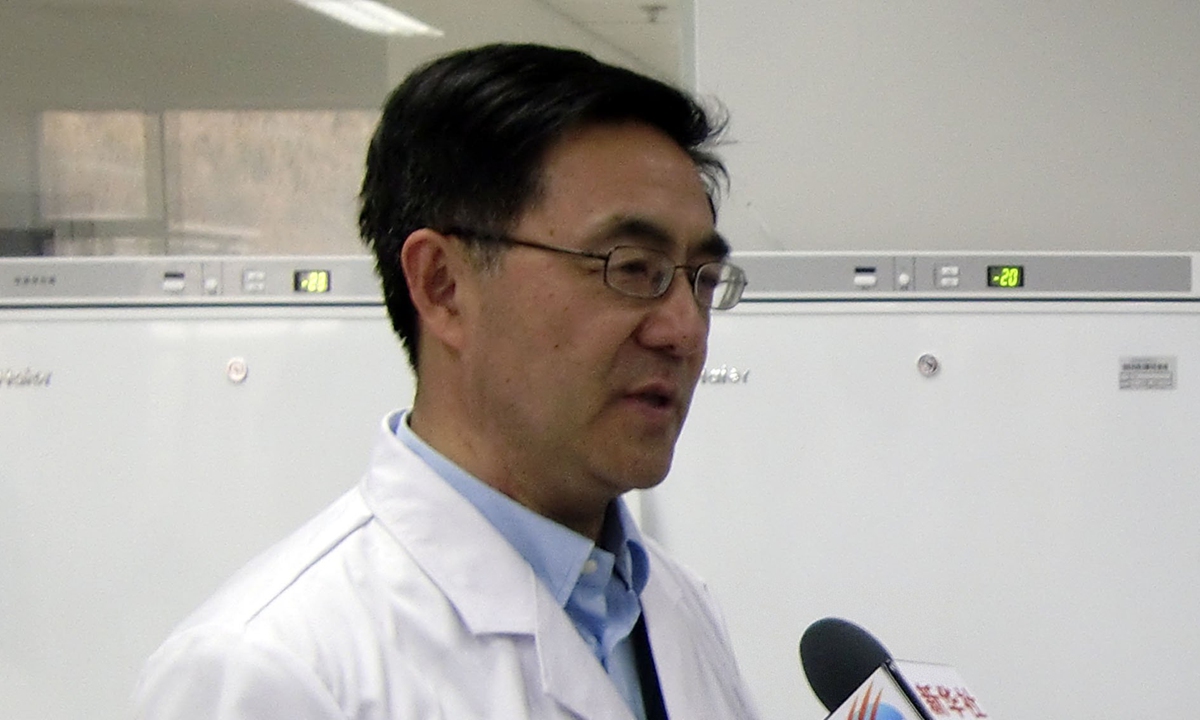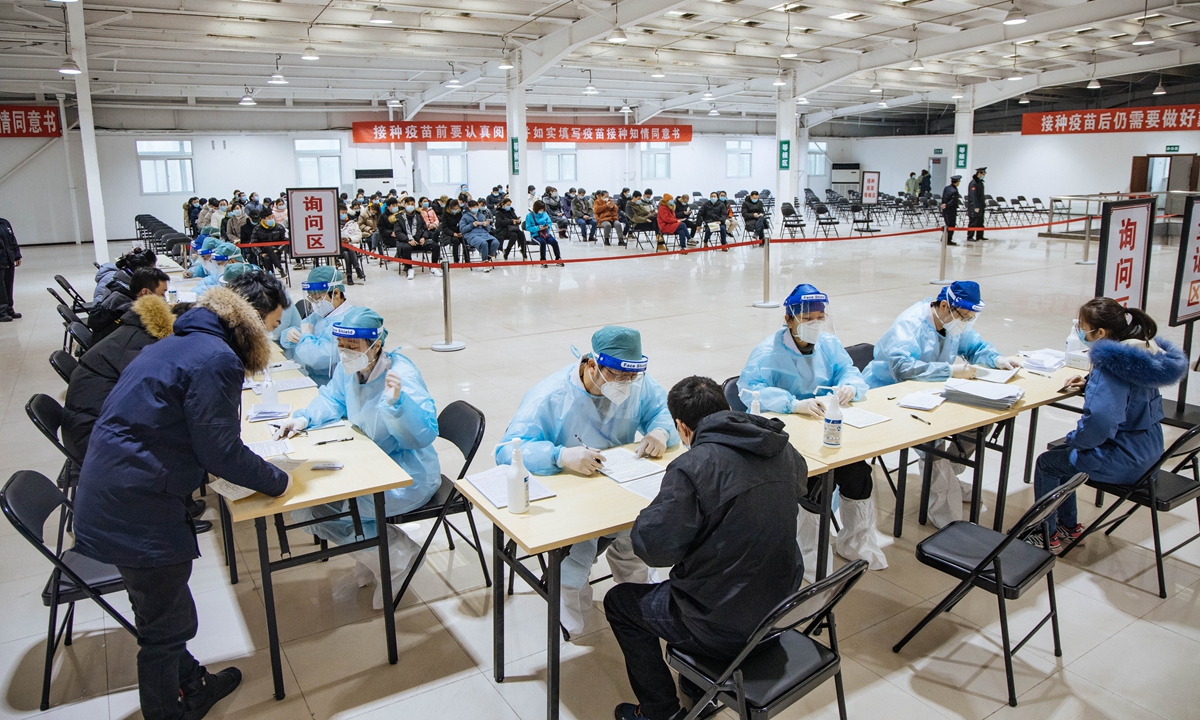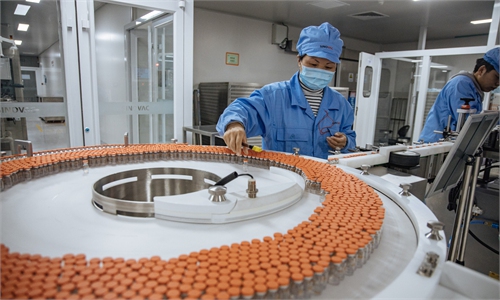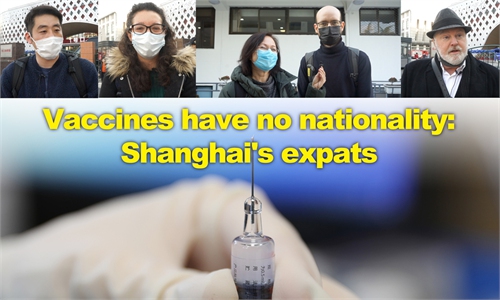Chinese scientists, producers assess need to redesign vaccines against new mutations: top immunologist
Editor's Note:
What are the approval criteria for COVID-19 vaccines in China? Are Chinese vaccines still effective against mutant strains? How to view compliment, doubt and smearing over the safety and efficacy of China's vaccines? Shao Yiming (Shao), China's leading physician-scientist and immunologist serving at the Chinese Center for Disease Control and Prevention shared his views in a recent exclusive interview with Global Times reporter Hu Yuwei (GT). As one of the chief medical advisors for the R&D of Chinese COVID-19 vaccines, also a member of the Product Development for Vaccine Advisory Committee of the World Health Organization (WHO), Shao has been involved in many vaccines' R&D and approval consultations since early 2020.

GT: When did China's drug administration first receive the data for overseas phase III clinical trials of its vaccines? What are the standards Chinese regulators follow in reviewing clinical data?
Shao: Chinese drug authorities obtained the final-stage data of Chinese-developed inactivated vaccines as early as late October, ahead of most countries.
China's drug regulator has always followed the protocol of "no compromise in standards, no skip or delay in procedures."
We all worked around the clock to review the data and gathered online for discussions even late at night, but we never relaxed the standards to meet public expectations.
Unlike the US, Chinese vaccine manufacturers are not allowed to publish data without official approval. This is to create an independent space for Chinese scientists to make sober and objective decisions over conditional approval.
In contrast, the vaccine review process in some Western countries such as the US has been proceeding with political pressure - electoral votes - and even pressure from pharmaceutical giants that traditionally dominate the global market.
GT: Are Chinese-developed COVID-19 vaccines effective against known mutant coronavirus strains? With the emergence of more mutations circulating now in South Africa and Brazil, are we prepared to upgrade the vaccine?
Shao: Preliminary lab results show that antibodies produced by Chinese inactivated COVID-19 vaccines can neutralize existing variants found in the UK and South Africa, although the efficacy is slightly weakened.
Chinese scientists are working with vaccine producers to study mutations, and lab studies are underway to understand the potential implications for Chinese vaccines.
They are assessing the need to redesign vaccines against new mutations now. Even in the worst-case scenario, inactivated vaccines could be redesigned and tweaked for a better fit in around two months, said Shao. "But other technological routes may not be as fast."
GT: In theory, should we accelerate vaccinations to outpace the mutation of the coronavirus and develop herd immunity as soon as possible?
Shao: That's right. If we accelerate vaccinations, we can keep the viral spread to a minimum, even if we are not able to eliminate it completely. In my expectations so far, we are unlikely to fully wipe out the coronavirus like how we killed SARS, and we will face the persistent virus with sporadic cases across the world, though with minimized infectivity stemming from human effort, just like with Ebola.

GT: Sinovac's vaccine, CoronaVac, reported 77.96% efficacy in preventing mild cases and overall 50.4% efficiency in Brazil's last-stage trials, with all participants being medical workers at high risk of contracting the virus. However, some argue that the vaccinated group and the placebo group were exposed to the same environmental risks, so the environment should not affect the efficacy figure. How do you view such commentary?
Shao: The vaccine protection rate will gradually decrease with more exposure to the virus. Of course, it will protect the general population better than frontline healthcare workers.
For example, if I build a bridge that can withstand a magnitude 7 earthquake in an area where earthquakes are rare, it won't exactly come down, but if I build a similar bridge in an area where earthquakes are frequent, it may collapse by suffering repeated magnitude 9 or 10 earthquakes.
The same is true with vaccines, which provide sufficient protection to the general population, but that protection decreases if they are given to high-risk healthcare workers who are frequently infected with the virus.
That is why we predict higher effectiveness of CoronaVac will be seen in community use for the general population.
Moreover, the data received from the Phase III trials of CoronaVac are scientific and peer-reviewed. The trials in Brazil were supervised by an American team and the data was analyzed by an Austrian firm. We should respect the scientific conclusion of the independent third parties.
GT: Do you think there is a lack of clinical trial data for the elderly, children and people with basic diseases? Should we vaccinate people over 80 years old now, given reports that 23 elderly Norwegian people died after receiving the vaccine?
Shao: In fact, we have covered all age groups in phase I and phase II trials in China, and shown that it is safe for these people, but there is a lack of efficacy data.
By the end of last year, there were already two million people in emergency use, with the elderly also making up a significant proportion, lending good credibility for its safety among seniors.
But I don't think people over 80 need to be vaccinated in a hurry. Because of our strict measures to prevent and control the epidemic, seniors remain basically well protected, unlike Western countries, which are in a real hurry to vaccinate the elderly.
GT: Does the world need a united approach to fight the virus? What joint efforts can China and the US make in vaccine R&D?
Shao: We actually live in a global village now. Despite some conflict and friction, all villagers have concerted efforts to put out a fire if it breaks out. Only if we have a coordinated global response can we really have an effective response.
I have hope and confidence in the new US presidency, and in Dr. Anthony Stephen Fauci, my friend of more than 30 years and a wonderful scientist. China and the US are highly expected to join hands to lead the global fight against the epidemic.
In terms of vaccine R&D, China focuses on the most traditional inactivated vaccine, while the US takes on the most technically-difficult mRNA vaccine. We provide different options for developing and developed countries respectively.
GT: Although China leads the world in the R&D of COVID-19 inactivated vaccines, some people overseas still distrust Chinese vaccines. How do you see the difficulties and challenges faced by Chinese vaccines going overseas?
Shao: I have been encouraging the Chinese drug authorities to approve more vaccine production centers as soon as possible, and then export Chinese vaccines to Africa and other countries through international agencies as fast as possible, to really benefit local people. Only when the effectiveness of Chinese vaccines is felt in the real world, can trust in the vaccine brand be most convincing.
The global pharmaceutical industry, including vaccines, has long been dominated by American giants. The COVID-19 vaccine is a good opportunity for China to break the monopoly. But a successful overseas route needs to be driven by the whole state system and governmental efforts, not by vaccine companies alone.
COVID-19 will also offer an opportunity for Chinese vaccines to rebuild its international reputation. China's vaccines have never lagged behind, but lack a better opportunity to showcase them.
What are the approval criteria for COVID-19 vaccines in China? Are Chinese vaccines still effective against mutant strains? How to view compliment, doubt and smearing over the safety and efficacy of China's vaccines? Shao Yiming (Shao), China's leading physician-scientist and immunologist serving at the Chinese Center for Disease Control and Prevention shared his views in a recent exclusive interview with Global Times reporter Hu Yuwei (GT). As one of the chief medical advisors for the R&D of Chinese COVID-19 vaccines, also a member of the Product Development for Vaccine Advisory Committee of the World Health Organization (WHO), Shao has been involved in many vaccines' R&D and approval consultations since early 2020.

Shao Yiming Photo: Xinhua
GT: When did China's drug administration first receive the data for overseas phase III clinical trials of its vaccines? What are the standards Chinese regulators follow in reviewing clinical data?
Shao: Chinese drug authorities obtained the final-stage data of Chinese-developed inactivated vaccines as early as late October, ahead of most countries.
China's drug regulator has always followed the protocol of "no compromise in standards, no skip or delay in procedures."
We all worked around the clock to review the data and gathered online for discussions even late at night, but we never relaxed the standards to meet public expectations.
Unlike the US, Chinese vaccine manufacturers are not allowed to publish data without official approval. This is to create an independent space for Chinese scientists to make sober and objective decisions over conditional approval.
In contrast, the vaccine review process in some Western countries such as the US has been proceeding with political pressure - electoral votes - and even pressure from pharmaceutical giants that traditionally dominate the global market.
GT: Are Chinese-developed COVID-19 vaccines effective against known mutant coronavirus strains? With the emergence of more mutations circulating now in South Africa and Brazil, are we prepared to upgrade the vaccine?
Shao: Preliminary lab results show that antibodies produced by Chinese inactivated COVID-19 vaccines can neutralize existing variants found in the UK and South Africa, although the efficacy is slightly weakened.
Chinese scientists are working with vaccine producers to study mutations, and lab studies are underway to understand the potential implications for Chinese vaccines.
They are assessing the need to redesign vaccines against new mutations now. Even in the worst-case scenario, inactivated vaccines could be redesigned and tweaked for a better fit in around two months, said Shao. "But other technological routes may not be as fast."
GT: In theory, should we accelerate vaccinations to outpace the mutation of the coronavirus and develop herd immunity as soon as possible?
Shao: That's right. If we accelerate vaccinations, we can keep the viral spread to a minimum, even if we are not able to eliminate it completely. In my expectations so far, we are unlikely to fully wipe out the coronavirus like how we killed SARS, and we will face the persistent virus with sporadic cases across the world, though with minimized infectivity stemming from human effort, just like with Ebola.

Doctors check information with people who are taking the second dose of the COVID-19 vaccine in Shijingshan district, Beijing on Monday. Photo: Li Hao/GT
GT: Sinovac's vaccine, CoronaVac, reported 77.96% efficacy in preventing mild cases and overall 50.4% efficiency in Brazil's last-stage trials, with all participants being medical workers at high risk of contracting the virus. However, some argue that the vaccinated group and the placebo group were exposed to the same environmental risks, so the environment should not affect the efficacy figure. How do you view such commentary?
Shao: The vaccine protection rate will gradually decrease with more exposure to the virus. Of course, it will protect the general population better than frontline healthcare workers.
For example, if I build a bridge that can withstand a magnitude 7 earthquake in an area where earthquakes are rare, it won't exactly come down, but if I build a similar bridge in an area where earthquakes are frequent, it may collapse by suffering repeated magnitude 9 or 10 earthquakes.
The same is true with vaccines, which provide sufficient protection to the general population, but that protection decreases if they are given to high-risk healthcare workers who are frequently infected with the virus.
That is why we predict higher effectiveness of CoronaVac will be seen in community use for the general population.
Moreover, the data received from the Phase III trials of CoronaVac are scientific and peer-reviewed. The trials in Brazil were supervised by an American team and the data was analyzed by an Austrian firm. We should respect the scientific conclusion of the independent third parties.
GT: Do you think there is a lack of clinical trial data for the elderly, children and people with basic diseases? Should we vaccinate people over 80 years old now, given reports that 23 elderly Norwegian people died after receiving the vaccine?
Shao: In fact, we have covered all age groups in phase I and phase II trials in China, and shown that it is safe for these people, but there is a lack of efficacy data.
By the end of last year, there were already two million people in emergency use, with the elderly also making up a significant proportion, lending good credibility for its safety among seniors.
But I don't think people over 80 need to be vaccinated in a hurry. Because of our strict measures to prevent and control the epidemic, seniors remain basically well protected, unlike Western countries, which are in a real hurry to vaccinate the elderly.
GT: Does the world need a united approach to fight the virus? What joint efforts can China and the US make in vaccine R&D?
Shao: We actually live in a global village now. Despite some conflict and friction, all villagers have concerted efforts to put out a fire if it breaks out. Only if we have a coordinated global response can we really have an effective response.
I have hope and confidence in the new US presidency, and in Dr. Anthony Stephen Fauci, my friend of more than 30 years and a wonderful scientist. China and the US are highly expected to join hands to lead the global fight against the epidemic.
In terms of vaccine R&D, China focuses on the most traditional inactivated vaccine, while the US takes on the most technically-difficult mRNA vaccine. We provide different options for developing and developed countries respectively.
GT: Although China leads the world in the R&D of COVID-19 inactivated vaccines, some people overseas still distrust Chinese vaccines. How do you see the difficulties and challenges faced by Chinese vaccines going overseas?
Shao: I have been encouraging the Chinese drug authorities to approve more vaccine production centers as soon as possible, and then export Chinese vaccines to Africa and other countries through international agencies as fast as possible, to really benefit local people. Only when the effectiveness of Chinese vaccines is felt in the real world, can trust in the vaccine brand be most convincing.
The global pharmaceutical industry, including vaccines, has long been dominated by American giants. The COVID-19 vaccine is a good opportunity for China to break the monopoly. But a successful overseas route needs to be driven by the whole state system and governmental efforts, not by vaccine companies alone.
COVID-19 will also offer an opportunity for Chinese vaccines to rebuild its international reputation. China's vaccines have never lagged behind, but lack a better opportunity to showcase them.



